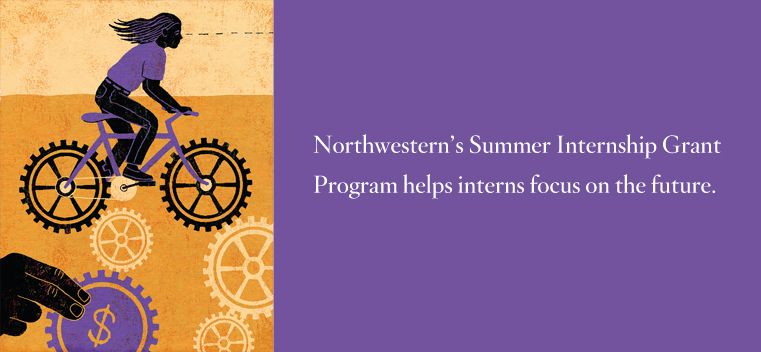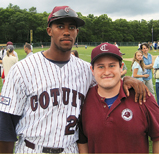
Alumni Put the Paid in Unpaid Internships
To find out how you can support Northwestern’s Summer Internship Grant Program, please contact Nancy Bennett.
Find Us on Social Media
Grant program helps interns focus on the future.
Elizabeth Machesky had all but decided to go to law school, but then she began to have second thoughts. She began to wonder about her other options. She wondered if there were a path she could take that would allow her to help people in need.
An unpaid internship helped illuminate that path.
“This past summer really showed me that law school doesn’t have to be my next stop,” says Machesky, who spent the summer working in the Detroit office of Sen. Carl Levin, D-Mich. Now her aspirations have broadened. “I actually just completed an application for a master’s program in public policy. That was something I never thought I’d be interested in before working in the senator’s office and listening to the perspectives of my co-workers.”
The history senior from Brownstown, Mich., was among 57 Northwestern students whose unpaid internships last summer were supported with a $2,500 grant from Northwestern’s Summer Internship Grant Program. Individual alumni donors, the Alumnae of Northwestern University and the Council of One Hundred, a women’s alumni mentoring organization, fund the initiative, which is administered by University Career Services.
Increasing the opportunities for experiential learning is a crucial part of Northwestern’s new strategic plan, and in addition to enabling these experiences, SIGP requires students to reflect on them. SIGP participants must write about their internships on a LinkedIn blog throughout the summer and offer feedback to their peers.
“When else in your life can you have one foot in academia and one foot in the real world?” asks Nancy Bennett (GSESP05), an internship specialist at University Career Services, who oversees SIGP, which offers a rare paid educational internship experience. “There’s so much learning that goes on.”
SIGP, which started with the awarding of 10 grants in 2007, has two goals: to give students funding to explore their career options and help them make informed decisions about their future. There have been 172 total SIGP grant recipients since 2007. SIGP administrators hope to increase the number of grants given so even more students can be supported.
A committee made up of University Career Services and Northwestern Alumni Association staff, members of the Alumnae and student participants from the previous year selects recipients. Students are selected based on how well they articulate what they want to pursue as well as their level of financial need.
“Knowing I got the SIGP grant meant that I didn’t have to work an additional job that would have taken away from the experience I had at Sen. Levin’s office,” Machesky says. “It gave me time to work the full amount of hours and give it my all.”

Seth Bernstein with Cotuit Kettleers outfielder Victor Roache
Bennett says SIGP seems to attract two kinds of students: those in exploration mode and those who know exactly what they want to do but need more experience to get there. Count journalism junior Seth Bernstein in that latter group. The sports co-director at the campus radio station, WNUR, has wanted to be a baseball broadcaster since he was in the fourth grade. He received a SIGP grant to broadcast games in the Cape Cod Baseball League.
“It was great,” he says. “I had the best summer of my life. My job was to basically wake up and broadcast baseball every day. I got a lot of experience in the field. When you want to be a baseball broadcaster, one of the most important things is to rack up inning after inning and do it daily. That’s how you get better.”
Machesky says interning for Levin taught her how to better communicate and connect with people. She interacted with veterans, immigrants, people at risk of losing their homes, even angry constituents calling to vent their frustrations during the budget crisis. “I learned so much,” she says.



 Facebook
Facebook Twitter
Twitter Email
Email


